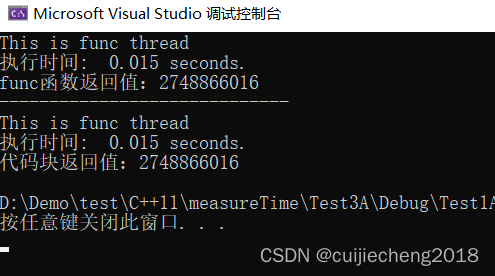博文《C++多线程教程(二)衡量线程执行时间》讲述了一种衡量线程执行时间的方法。
通过measure函数对func函数的执行时间进行测量:
#include<iostream>
#include<thread>
using namespace std;
using namespace std::chrono; //增加引用空间
template<class T>
void measure(T&& func) {
auto beg_t = system_clock::now(); //开始时间
func(); //执行函数
auto end_t = system_clock::now(); //结束时间
duration<double> diff = end_t - beg_t;
printf("performTest total time: ");
cout << diff.count()<<endl;
}
void func() {
cout << "This is func thread " << endl;
int s = 0;
for (int i = 0; i < 5; i++)
s += i;
}
int main() {
measure(func);
}
对于绝大部分情况,这种方式是足够了,但是缺陷也很明显:measure函数不支持带有参数的函数,而且无法打印函数的返回值。
所以本文对此方法进行优化,通过万能引用 + 变长参数模板 + std::future 实现支持对 携带任意参数和返回值的函数进行测量。优化后代码如下:
#include <thread>
#include <memory>
#include <future>
#include <functional>
#include <chrono>
#include <iostream>
using namespace std;
template<class T, class... Args>
auto measure(T&& func, Args&&... args)->std::future<typename std::result_of<T(Args...)>::type>
{
using return_type = typename std::result_of<T(Args...)>::type;
auto task = std::make_shared<std::packaged_task<return_type()>>
(std::bind(std::forward<T>(func), std::forward<Args>(args)...));
std::future<return_type> res = task->get_future();
auto begin = std::chrono::high_resolution_clock::now();
(*task)();
auto end = std::chrono::high_resolution_clock::now();
auto elapsed = std::chrono::duration_cast<std::chrono::nanoseconds>(end - begin);
printf("执行时间: % .3f seconds.\n", elapsed.count() * 1e-9);
return res;
}
unsigned int func(unsigned int nloopTime) {
cout << "This is func thread " << endl;
unsigned int s = 0;
for (unsigned int i = 0; i < nloopTime; i++)
s += i;
return s;
}
int main() {
future<unsigned int> res1 = measure(func, 9000000);
cout << "func函数返回值:" << res1.get() << endl;
printf("-----------------------------\n");
future<unsigned int> res2 = measure([](unsigned int nloopTime) {
cout << "This is func thread " << endl;
unsigned int s = 0;
for (unsigned int i = 0; i < nloopTime; i++)
s += i;
return s;
}, 9000000);
cout << "代码块返回值:" << res2.get() << endl;
}
执行效果如下:


